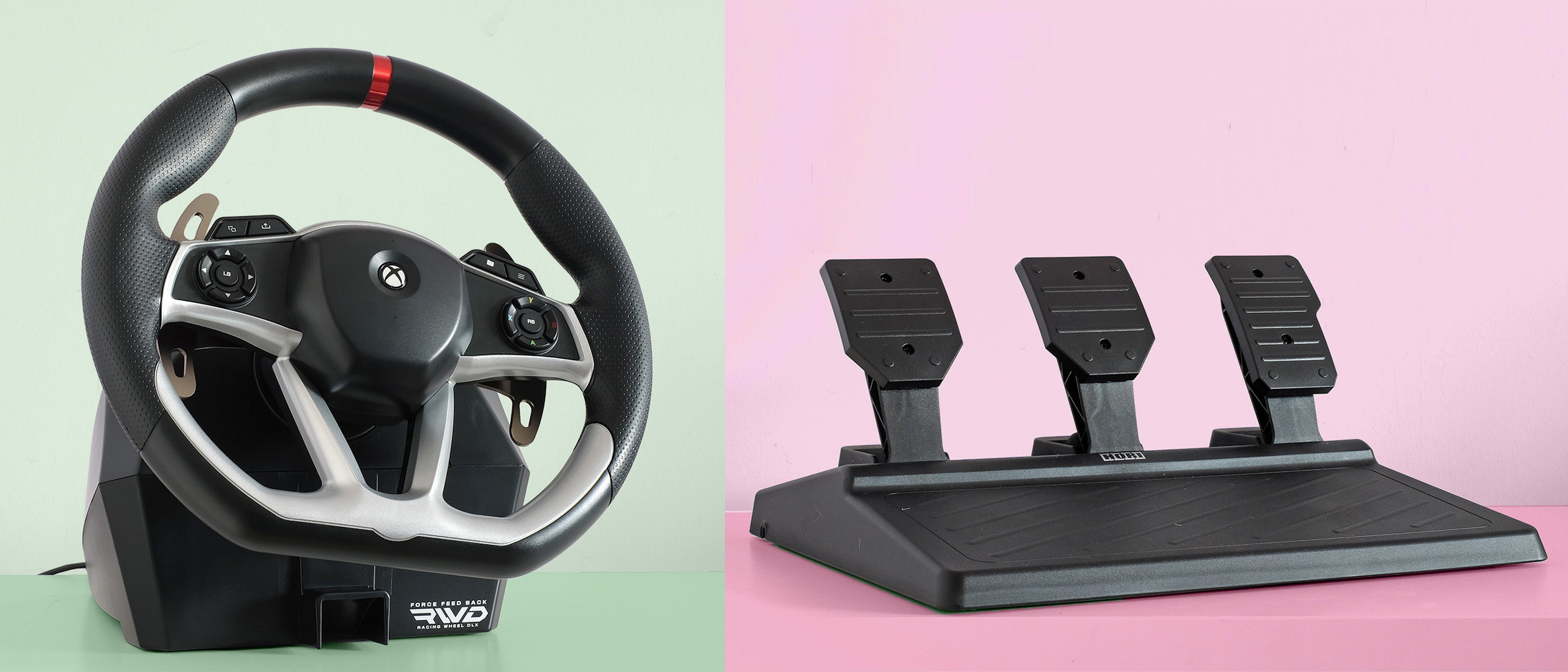TechRadar Verdict
The Hori Force Feedback Racing Wheel DLX is Hori's best wheel to date, but does not surpass the Thrustmaster and Logitech wheels available at a similar price. You can get more powerful force feedback and better build quality elsewhere. Still, it provides the force feedback fun and immersion we're after.
Pros
- +
Rubber brake stopper provides a somewhat realistic feel
- +
Quick-swap customizable profiles
- +
Low weight and easy setup is a good fit for occasional use
Cons
- -
Limited force feedback torque
- -
Plastic wheel rim feels a little hollow
- -
Lightweight all-plastic pedals
Why you can trust TechRadar
The Hori Force Feedback Racing Wheel DLX is an important racing wheel for two key reasons.
It’s the first force feedback wheel we’ve used from Hori, and marks the first time in ages we’ve seen a new competitor enter this particular ring. Logitech, Thrustmaster and Fanatec have been the only big names in mainstream wheels for years. We can now add Hori to that list.
Hori hasn’t messed up here. There are no “bad” force feedback racing wheels, and the Hori Force Feedback Racing Wheel DLX is a massive step up from basic Hori models like the RWA.
However, it may struggle against well established lines like the Logitech G920/G923 and the excellent Thrustmaster T300 RS/TX.
The Hori Force Feedback Racing Wheel DLX uses a reliable but not altogether smooth geared force feedback, like Logitech’s wheels. And has pretty basic pedals, like the entry-level Thrustmaster sets. We also find the strength of the force feedback slightly lacking, although those new to these wheels will likely be satisfied after tweaking in-game settings.
This is an admirable first attempt at a modern force feedback racing wheel from Hori, but would not be our number one recommendation unless you find the Hori Force Feedback Racing Wheel DLX selling at a sweet price.
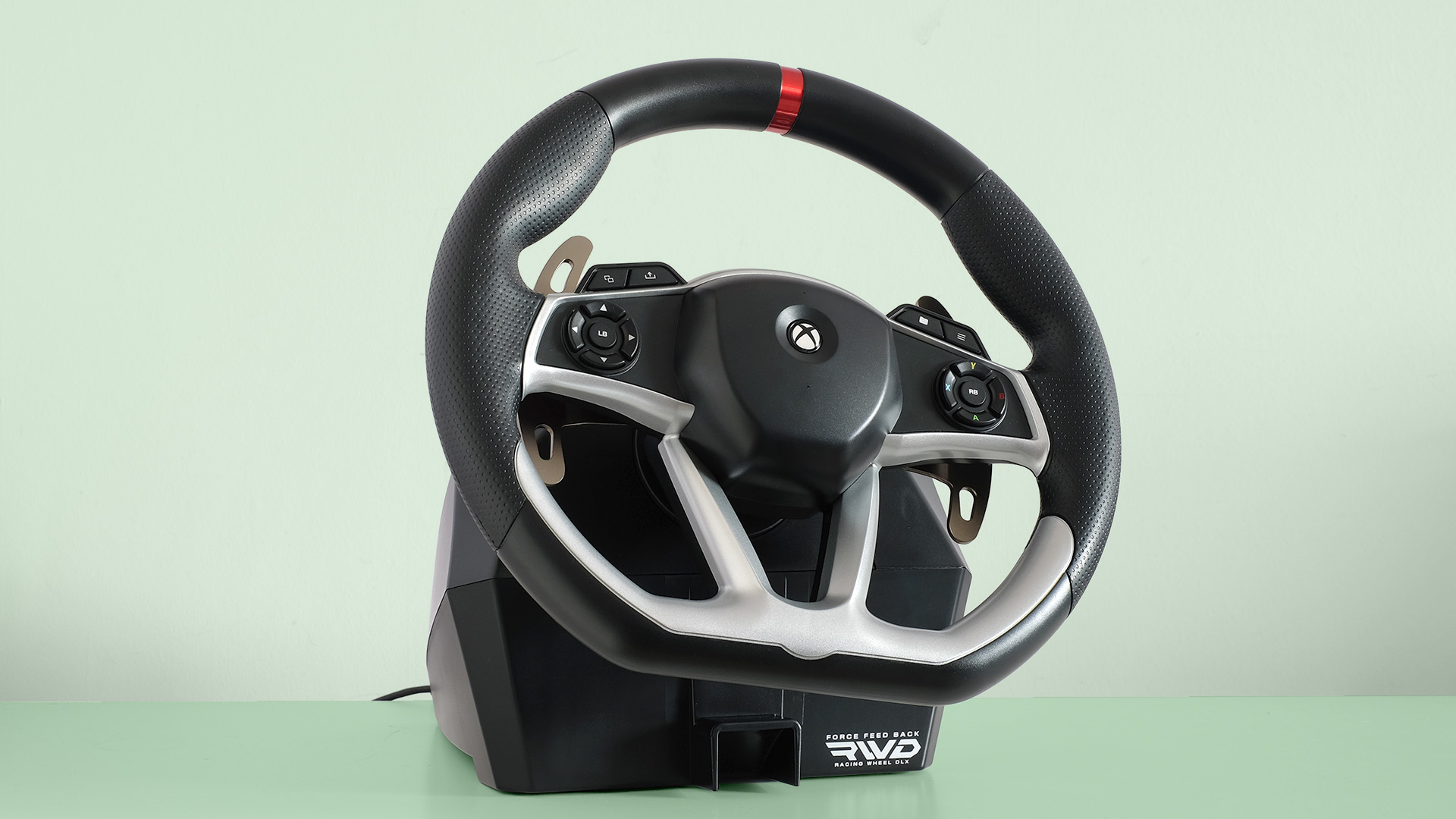
Price and Availability
The Hori Force Feedback Racing Wheel DLX started shipping rather quietly in 2021 after pre-order pages popped up online in late 2020.
It costs $300/£300/$534AU, a good deal more than the years-old Hori RWA Apex. However, that's a non-force feedback wheel, a bit of a toy next to this new DLX model.
The pricing means the Hori Force Feedback Racing Wheel DLX is closer in cost to the Logitech G923, and you can currently get the older but largely similar Logitech G920 for less cash. And in some countries you can get the two-pedal version of the Thrustmaster TX for similar money.
We make these particular comparisons because the Hori Force Feedback Racing Wheel DLX is an Xbox wheel. It won’t work with PlayStation consoles, and while it will support PC the software was still in the works during review. We tested the wheel primarily with an Xbox Series X console.
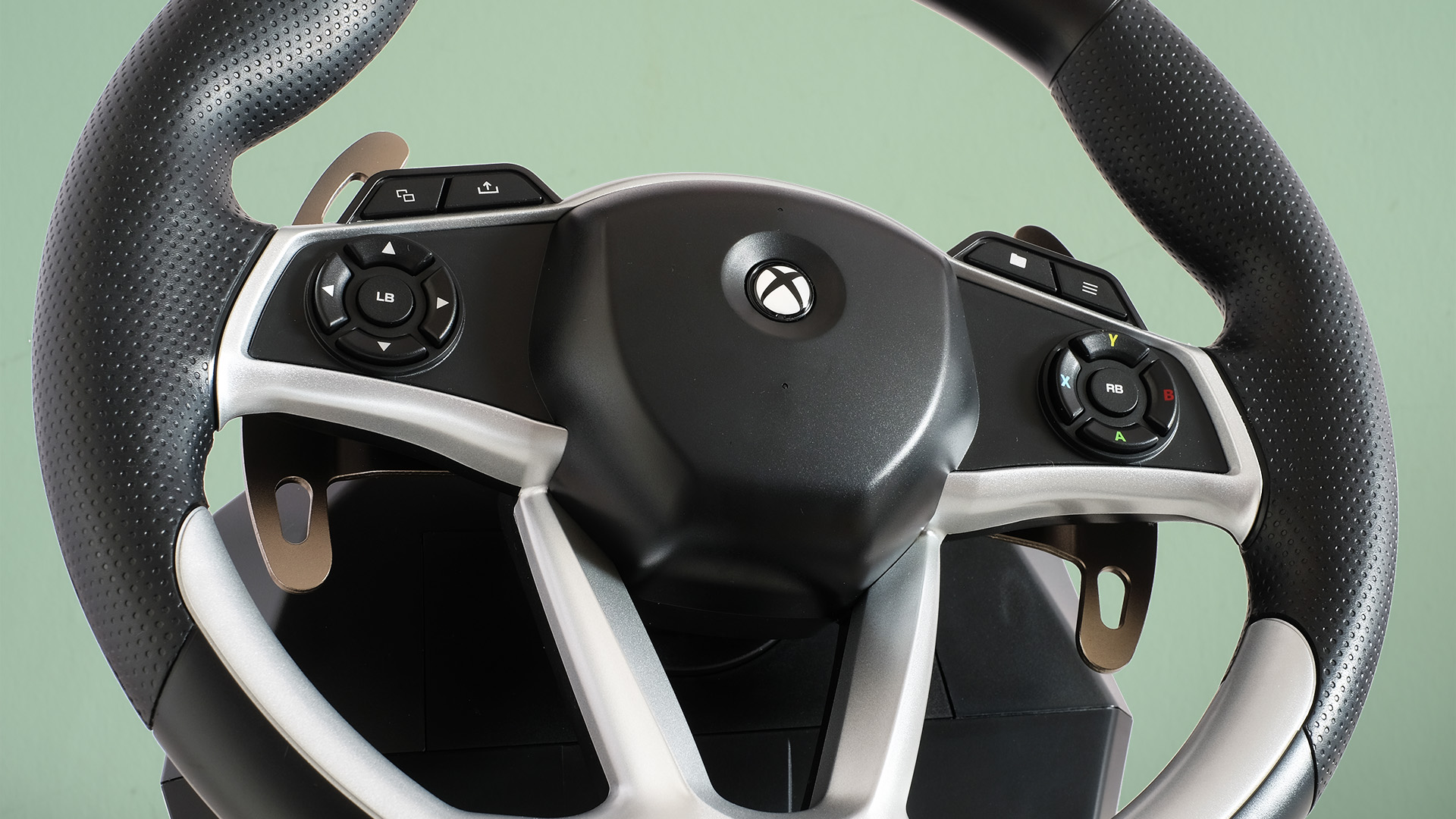
Design and what you get in the box
The Hori Force Feedback Racing Wheel DLX includes everything you need to get started. You get the base, the rim, a table clamp and the pedalboard.
Pedals hook up to the base using a little RJ45 connector, and you plug the wheel itself into your Xbox using a USB cable. It has its own power adapter, as the motors that provide the Hori Force Feedback Racing Wheel DLX’s force feedback need much more juice than can be transmitted over a standard USB-A connection.
It is very easy to setup, although as ever we recommend using this wheel with a wheel stand. The base isn’t anywhere near as heavy as a Fanatec ClubSport 2.5’s, and it includes a screw-in clamp that secures it to a surface.
In other words, it’s much like one of the other entry-level force feedback wheels. It's quick to setup, not something so heavy that bringing it out for a session after a month in the cupboard seems a huge chore. However, it’s also less flexible in other ways.
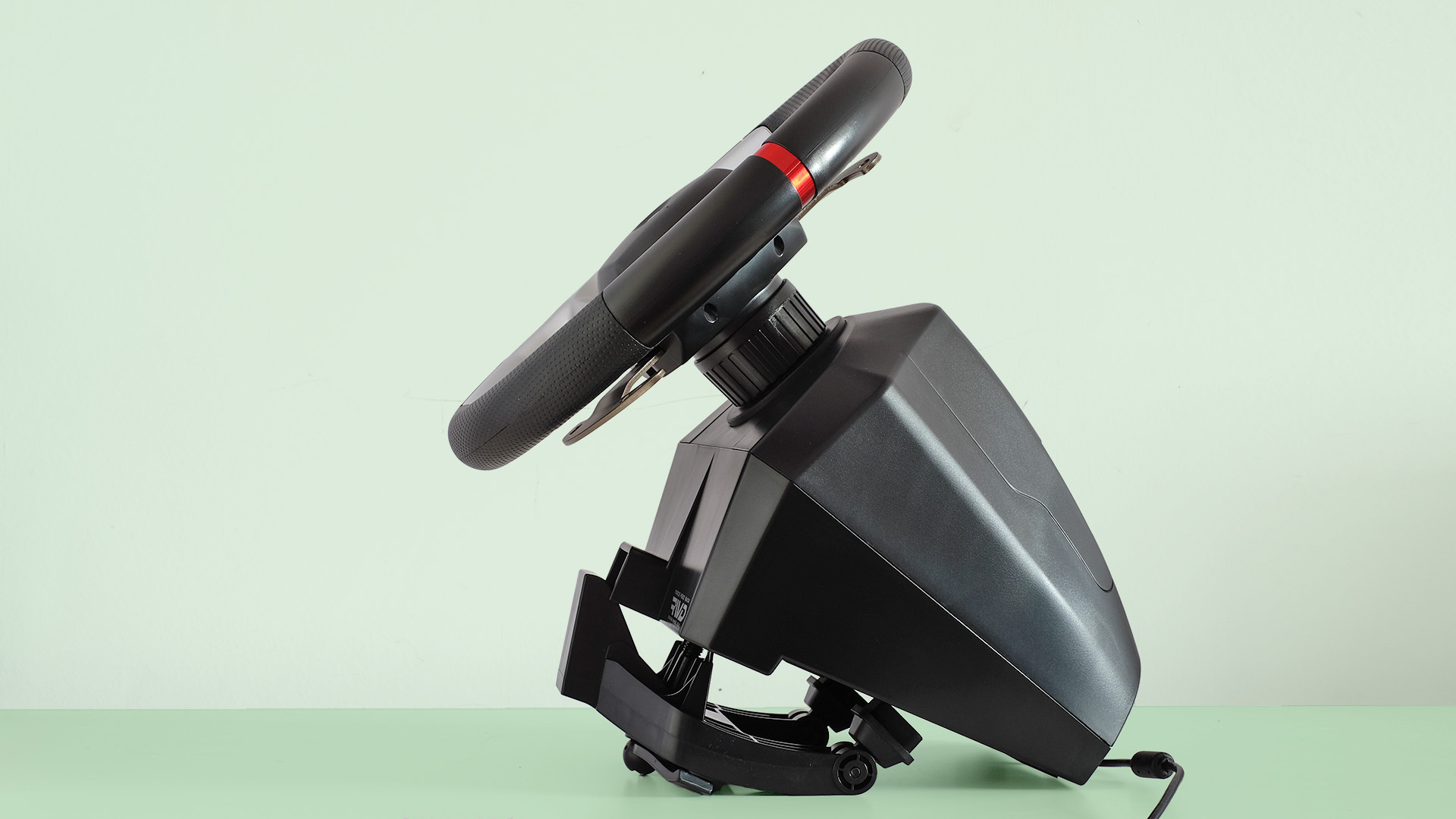
Unlike a Thrustmaster, you can’t easily remove the wheel rim. It’s connected fresh out of the box, suggesting there are no plans to widen this out to a wider modular system. Thrustmaster and Fanatec let you upgrade the rims separately, should you want something more ornate or higher-end in future.
The Hori Force Feedback Racing Wheel DLX is a good example of why you might want to do this too. Its rim is plastic: simple rubber grips and the wheel itself has a somewhat hollow quality. This isn’t a complaint about longevity. High-quality plastics are tough, but you experience everything through the wheel here, and the Logitech G920’s metal-core, leather-topped rim has a more satisfying feel.
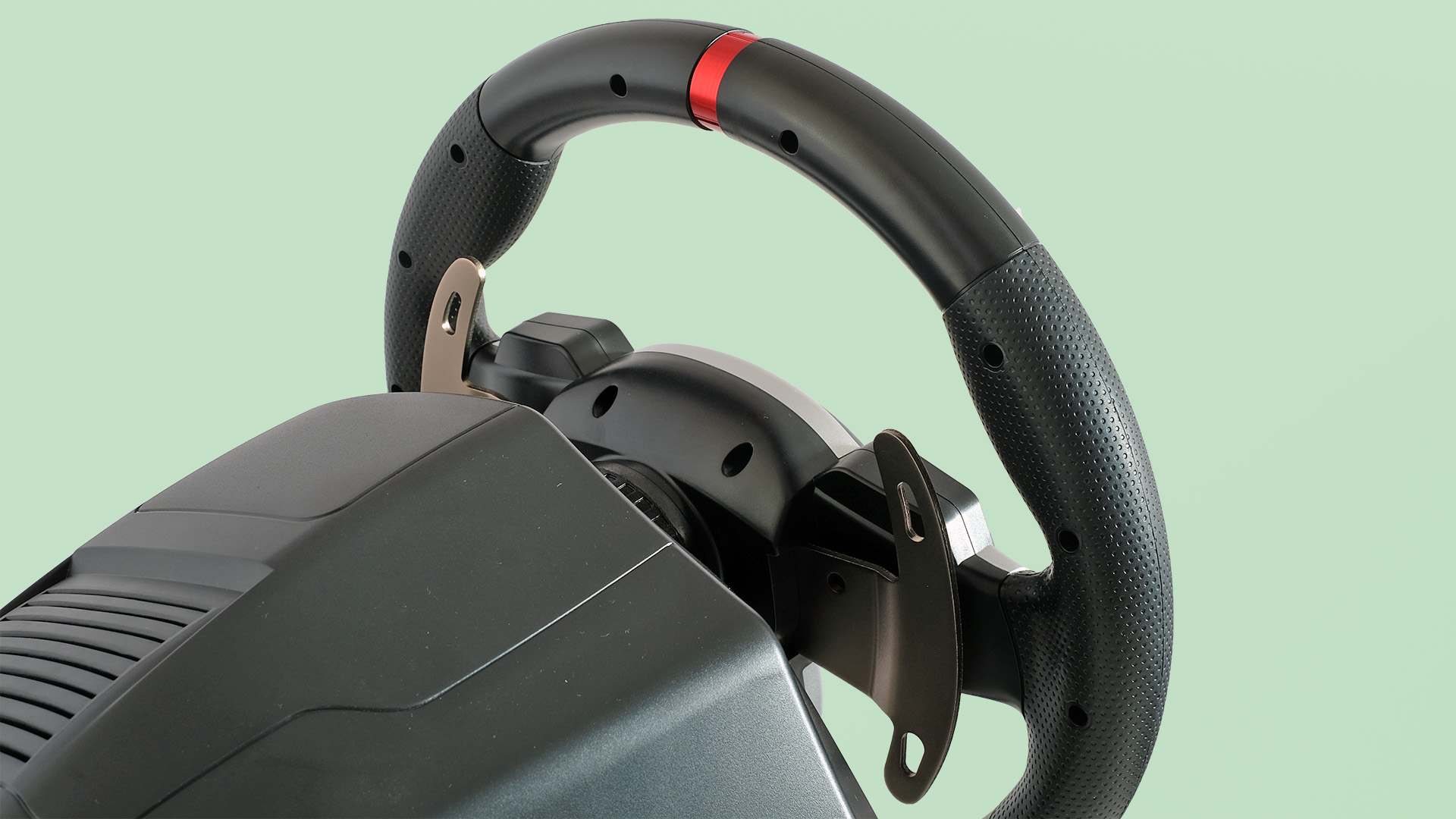
And, in case you’re wondering, all the silver parts on the Hori Force Feedback Racing Wheel DLX are plastic too. Only the paddle gear shifters behind the wheel are metal, and these depress with a nice positive click.
There’s not really an upgrade path here. However, there is potential for one. Two unused ports sit on the back of the wheelbase, suggesting Hori may have plans for a gear shifter, and perhaps a handbrake. We do question whether the Hori Force Feedback Racing Wheel DLX is likely to attract the hardcore crowd who might want that extra level of immersion, mind.
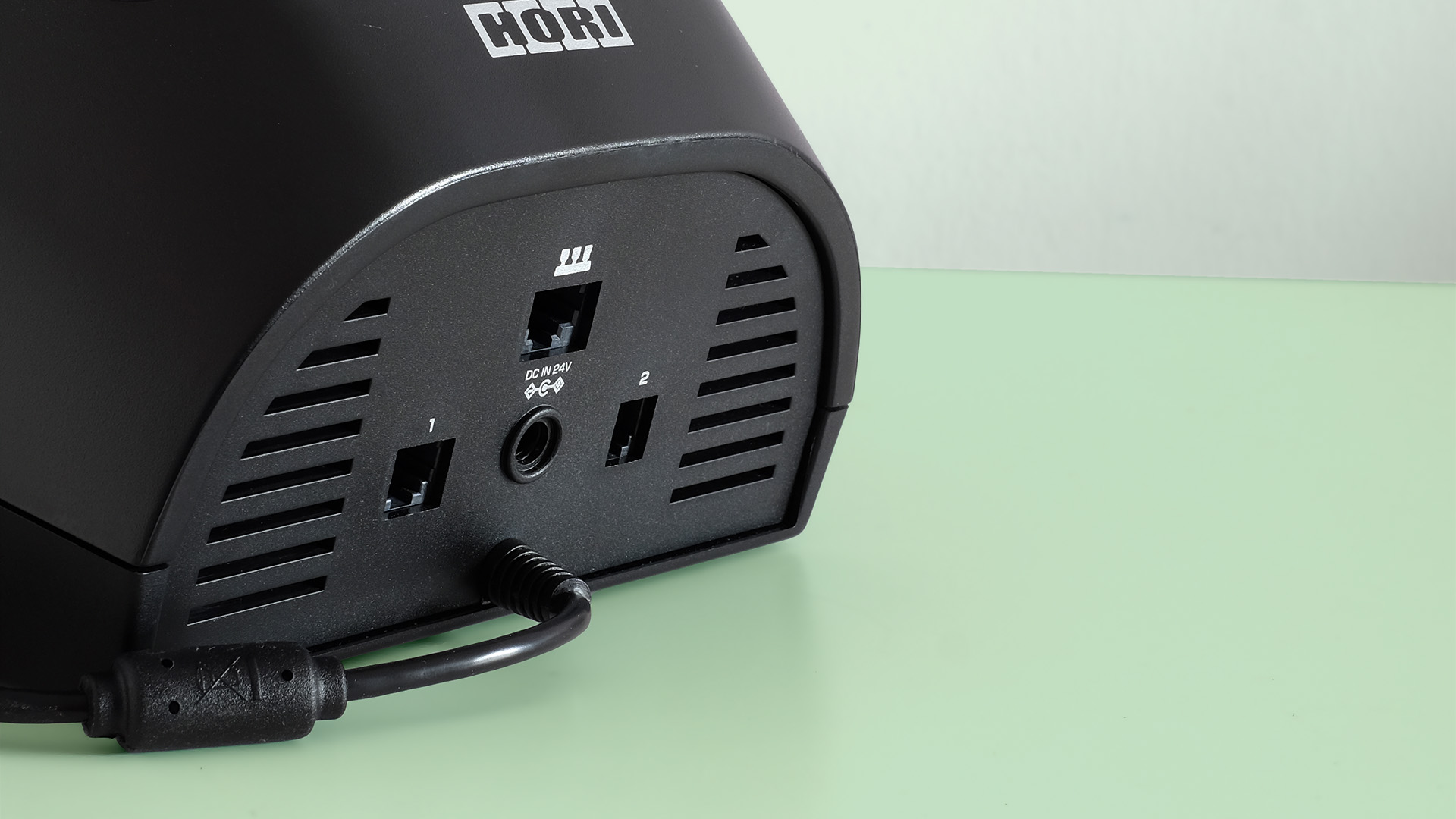
Force feedback
This comes down to the force feedback the Hori Force Feedback Racing Wheel DLX offers. It uses a gear-driven system, just like Logitech’s models.
It offers a less smooth feel to the rotation of the wheel than a belt-driven system, used by Thustmaster’s mid-range-and-up models, or the high-end direct drive style Fanatec now offers even in its base product, the Fanatec CSL DD.
This doesn’t ruin the fun at all, but does mean there’s a sort of granular quality to the Hori Force Feedback Racing Wheel DLX as you drive.
We also find this wheel offers possibly the least forceful feedback at this price, certainly less than the Thrustmaster T300RS. Our usual procedure when testing one of these wheels is to crank up the force feedback settings to the max to test its power, only to drop it down to about 75% after a while. The best of these wheels are so powerful they’re tire your arms out in no time at maximum force.
The Hori Force Feedback Racing Wheel DLX is more reserved. And we were initially a bit disappointed until we downloaded the Hori companion app from the Xbox store and found it is only set to “8” power out of “10” by default.
We increased this and maxed out the force feedback setting in the soon-to-be-delisted Forza Motorsport 7. Suddenly the Hori Force Feedback Racing Wheel DLX offered something much closer to the experience we’ve settled into from wheels like the Fanatec CSL Elite and Thrustmaster TX.
There’s a decent sensation of struggling against the wheel during high-speed turns, and that healthy feedback as your wheels lose traction.
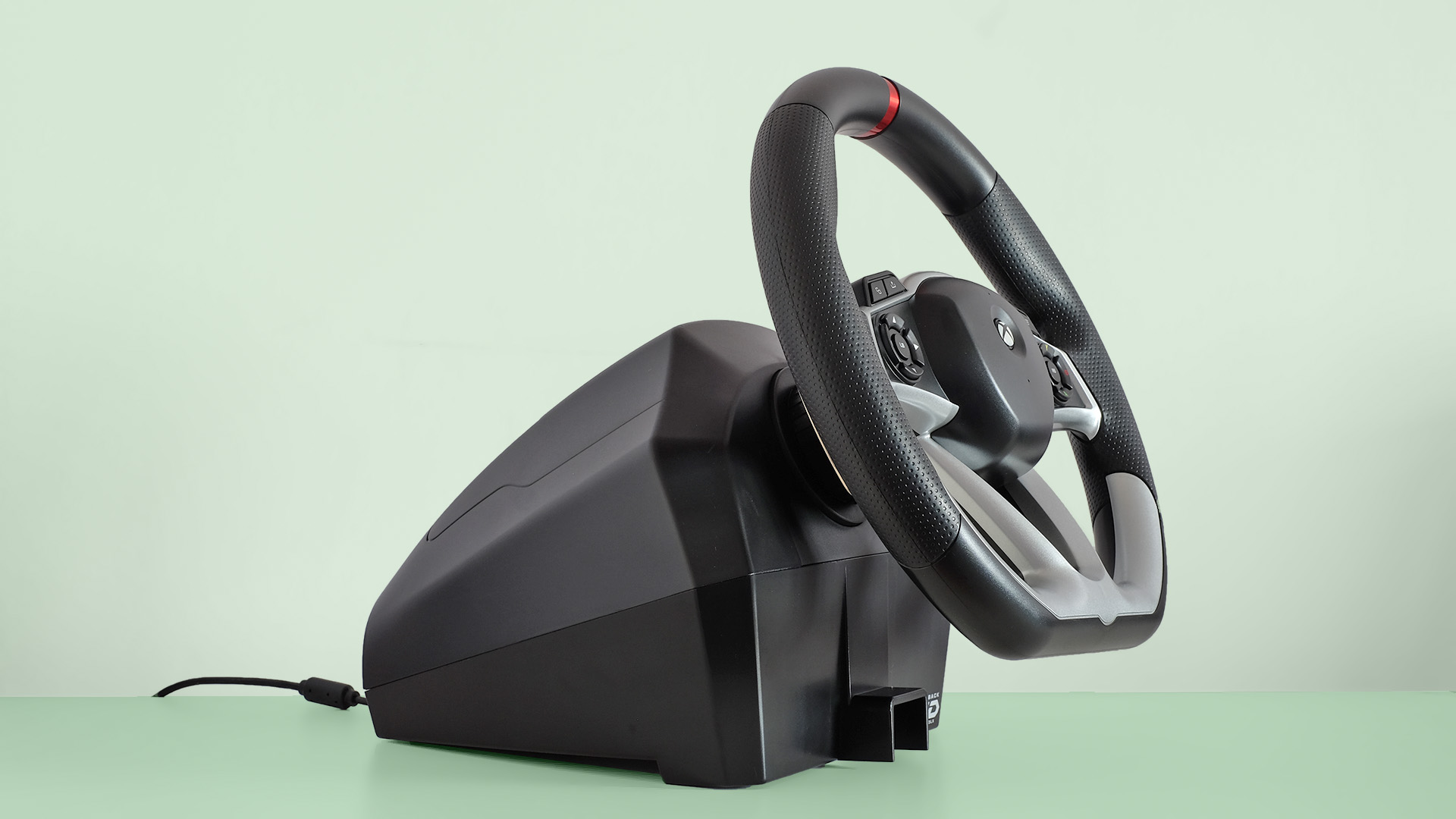
However, if you really want the hardcore experience that will leave your arms sore and build up your biceps, the Hori Force Feedback Racing Wheel DLX does not seem to offer it.
It comes down to torque, which is how the power of the force feedback motors in these wheels is traditionally measured. Hori has not published any figures on the torque on offer here, but the Force Feedback Racing Wheel DLX does seem to be one of the weaker models we’ve reviewed over the past five years.
This lends the wheel a slightly more arcadey feel, particularly if you don’t take the time to fiddle with its settings. We also recommend going easy on the rumble effects, which are also customizable.
The Hori Force Feedback Racing Wheel DLX’s dual motors let it generate both conventional force feedback and rumble that emulates road surface feel. However, these can overshadow the former because of that somewhat reserved torque.
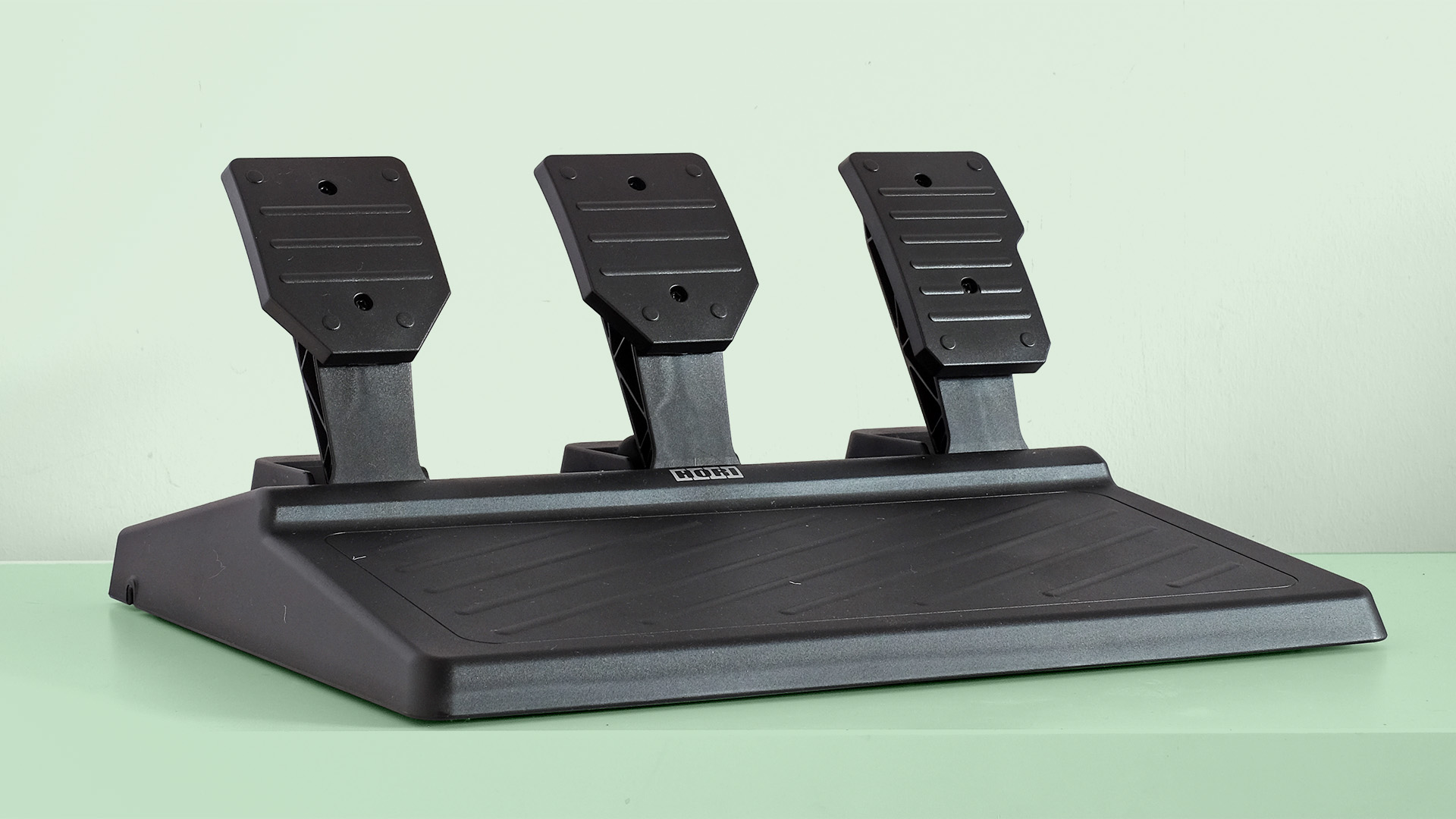
Pedals
The same effect is seen in the Hori Force Feedback Racing Wheel DLX’s pedals. This is a three-pedal board: clutch, brake, accelerator.
It sits somewhere between the base two-pedal Thrustmaster set and the Logitech G923 one in terms of quality.
You get that clutch, which is nice (and likely to be ignored by many), but the outer construction is entirely plastic and the resistance on all three is easygoing. The Hori Force Feedback Racing Wheel DLX’s brake is stiffer than the other two, but the enthusiast crowd are instantly going to turn their noses up at this lightweight board.
But you know what? We think it’s a pretty good for the kind of person who wants to try out a force feedback wheel without dedicating a room to the thing. Easy-to-depress pedals mean the board doesn’t instantly start moving if it isn’t secured in place firmly, and Hori puts a rubber stopper under the brake to make it bottom out naturally. As cheap a tweak as this is, it makes the brake feel much, much better than a pedal whose depression ends with a plastic-on-plastic clonk.
Of course, if you buy a Thrustmaster rival, you have the option to upgrade the basic pedal board if you really get into this hobby. Lots of people do. But at the moment we don’t know if Hori will release a higher-end pedal set in the future.
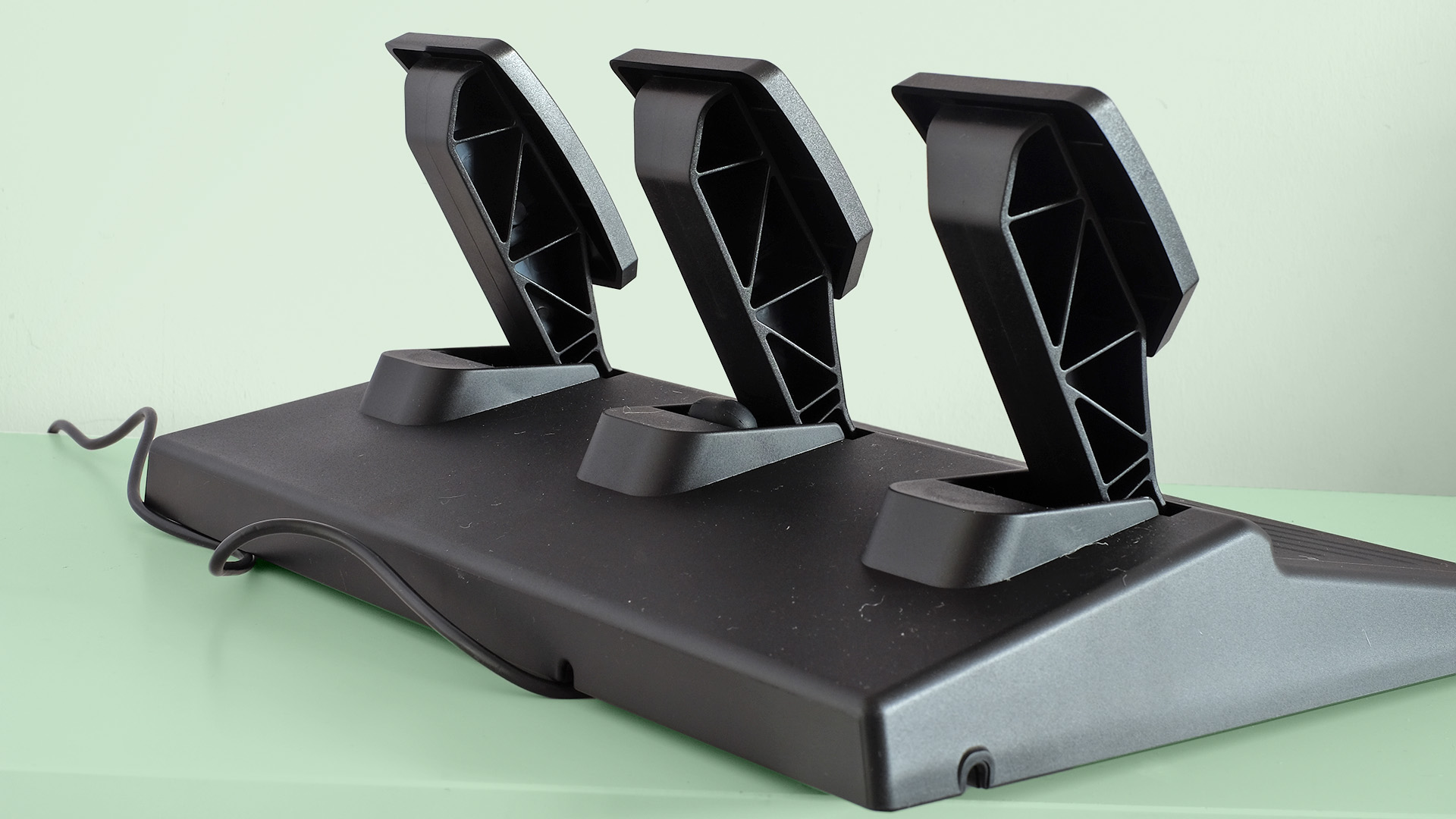
Other features
Let’s clean up a few of the Hori Force Feedback Racing Wheel DLX’s other vitals. It’s a 900-degree rotation wheel, a little less than the 1080 degrees offered by some rivals. But we don't think this should sway any buying decisions.
The Xbox app lets you create a bunch of different profiles for games. You can map the buttons to inputs, control the level of rumble/force feedback and customize dead zones and so on. There’s a button on the face of the wheel that switches between profiles, and the multi-color LED tells you which profile is currently active. An LCD screen with a displayed number would be preferable, but this solution does the job OK if you take the time to remember which colour you “linked” to a game.
This is a relatively quiet wheel, as it doesn't have the cooling fans seen in Thrustmaster and Fanatec wheels. It’s the result of those modest motors and the geared feedback system, which likely generates less heat than a belt-based one.
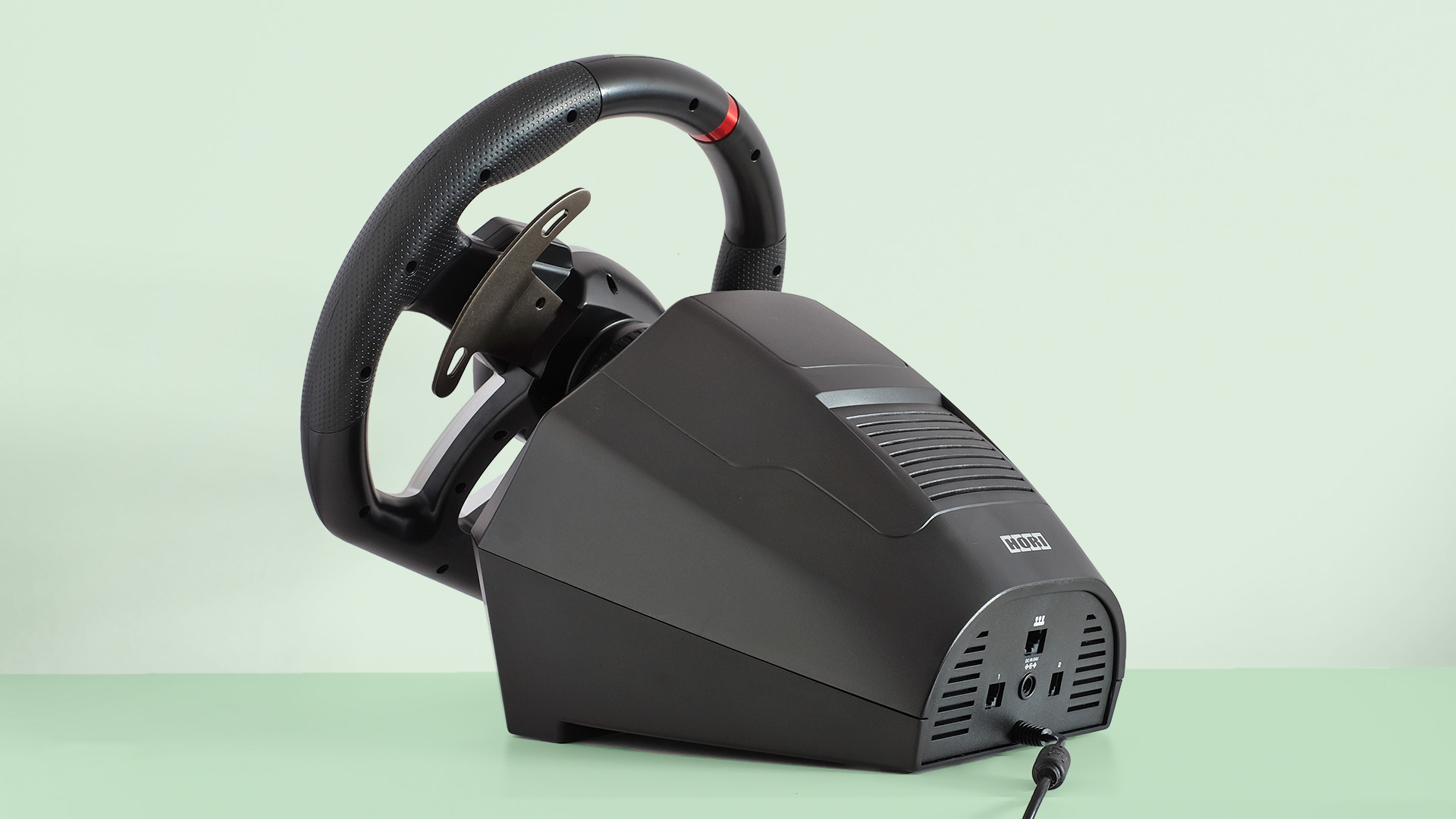
Buy if...
You want an easy-to-setup wheel
The Hori Force Feedback Racing Wheel DLX is a solid choice for Xbox gamers who want an occasional use wheel that is a big step up from the company's non-force-feedback models. It's not too heavy and gets by just fine without securing the wheelbase or pedals with screws.
You want to try force feedback without spending a fortune
While the Hori Force Feedback Racing Wheel DLX does not have class-leading force feedback, it does offer the fundamental immersive upgrade that every “sim” style racing game fan needs to experience. You can feel when the tires lose traction, and potent rumble effects emulate road surfaces reasonably well.
You like the idea of its profiles system
The Hori Force Feedback Racing Wheel DLX has a neat profile system that lets you change the wheel’s behaviour for different games. You can switch between them quickly with a button press on the wheel itself.
Don't buy if...
You primarily play PlayStation
Don’t buy the Hori Force Feedback Racing Wheel DLX if you’re primarily a PlayStation gamer. This wheel does not work with the PS4 or PS5, only Xbox consoles and PCs.
You want the most powerful force feedback
Want to experience the most powerful force feedback? We don't think the Hori Force Feedback Racing Wheel DLX is the best option. Thrustmaster’s mid-range wheels have greater torque, which lets them generate more resistance, which can feel more realistic and immersive. It’s also a geared system, which feels less smooth than Thrustmaster’s belt-driven approach.
You'll mind a plastic wheel
Some of you may be put off by the Hori Force Feedback Racing Wheel DLX’s plastic wheel rim and plastic pedals. The Logitech G923 and older G930 have more solid wheels, with a metal core and leather cover. Their pedals boards have metal caps and arms too, providing at the very least a veneer of high-end construction missing in the Hori.
- Best racing wheels: burn rubber with these great gaming accessories
Andrew is a freelance journalist and has been writing and editing for some of the UK's top tech and lifestyle publications including TrustedReviews, Stuff, T3, TechRadar, Lifehacker and others.
